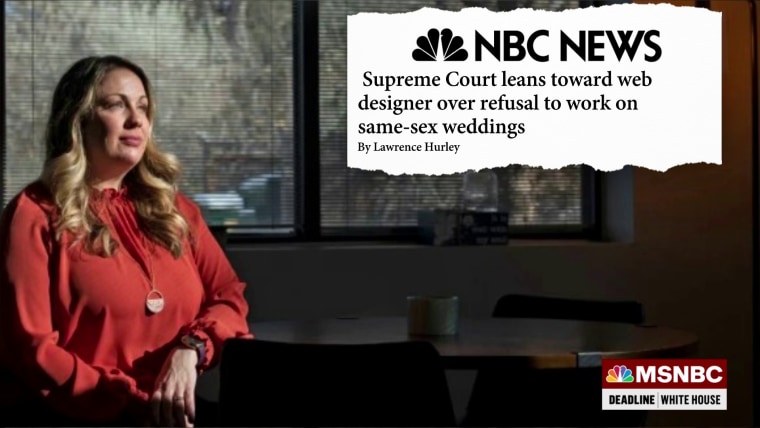It’s hard to forget Justice Samuel Alito’s flippant musings at oral arguments this week about Black shopping mall Santas and kids in Ku Klux Klan outfits.
But it’s important to remember what prompted Alito to make a fool of himself: a hypothetical scenario posed by the newest justice, Ketanji Brown Jackson, that no one on the right had a good answer to. It arose in the first of two high-profile hearings this week that displayed Jackson’s knack for smashing spurious claims.
The Biden appointee quizzed a lawyer for a Christian legal-advocacy group that’s pressing the court to rule that religious business owners — wedding website designers, in this case — don’t have to serve LGBTQ customers.
Here’s the holiday-themed hypothetical that Jackson gave the Alliance Defending Freedom’s Kristen Waggoner:
Can you give me your thoughts on a photography business in a shopping mall during the holiday season that offers a product called Scenes with Santa, and this business wants to express its own view of nostalgia about Christmases past by reproducing classic 1940s and 1950s Santa scenes. They do it in sepia tone and they are customizing each one. This is not off a rack. They’re really bringing the people in and having them interact with Santa, children, because they’re trying to capture the feelings of a certain era. But precisely because they’re trying to capture ... the feelings of a certain era, their policy is that only white children can be photographed with Santa in this way because that’s how they view the scenes with Santa that they’re trying to depict.
The implication of Jackson’s question being: If the court blesses an exception to anti-discrimination laws in this case, 303 Creative LLC v. Elenis, what’s to prevent the court from allowing racial discrimination in the future?
Waggoner didn’t appear to have a coherent answer.
Alito sought to avenge his side, when he grilled a lawyer for Colorado who defended the state’s anti-discrimination law.
“So, if there’s a ... Black Santa at the other end of the mall and he doesn’t want to have his picture taken with a child who’s dressed up in a Ku Klux Klan outfit ... that Black Santa has to do that?” Alito inquired.
The state’s lawyer, Eric Olson, swiftly batted away Alito’s half-clever hypothetical. “No, because Ku Klux Klan outfits are not protected characteristics under public accommodation laws,” he explained to the justice, who either knew or should have known that basic point.
The hearing somehow devolved further from there. Justice Elena Kagan observed that, “presumably, that would be the same Ku Klux Klan outfit regardless whether the child was Black or white or any other characteristic.” Alito, chuckling over the matter, quipped in response, “You do see ... a lot of Black children in Ku Klux Klan outfits, right? ... All the time."
As The Washington Post reported, Alito “sparked a backlash” on social media, prompting “complaints that he was being insensitive or unserious about a case in which he is likely to be in the majority, ruling for the designer.”
And that was just Monday.
In the other closely watched case this week, Moore v. Harper, Jackson poked holes in the fringe “independent state legislature” theory. The whacked-out notion advanced by Republicans could give state legislatures increased power over federal elections without state judicial review. Jackson pointed out that state legislatures are creatures of state constitutions, so they’re governed by those constitutions.
“I guess what I don’t understand is how you can cut the state constitution out of the equation when it is giving the state legislature the authority to exercise legislative power,” she told the lawyer for North Carolina Republicans, who are clinging to gerrymandered voting districts struck down in state court.
Jackson has likewise made her mark in crucial disputes over voting rights and affirmative action, among others earlier this term, her first on the court.
True, it’s common wisdom among Supreme Court watchers that oral arguments generally don’t change case outcomes. The briefs filed ahead of hearings do most of the work, and the justices know where they’re going in the big cases. Along with fellow Democratic appointees Sonia Sotomayor and Elena Kagan, Jackson is likely to find herself dissenting in most, if not all, of these big cases.
Nonetheless, these hearings provide a rare window into the notoriously cloistered body. Especially now that the court is regularly livestreaming arguments (they should be televised, too, but that’s a topic for another day), it’s important for the public over which the court rules to hear the justices’ minds at work. In doing so, we can hear absurd arguments — from lawyers and justices alike — picked apart in real time, even if Alito and co. will have the last laugh when the decisions come.

